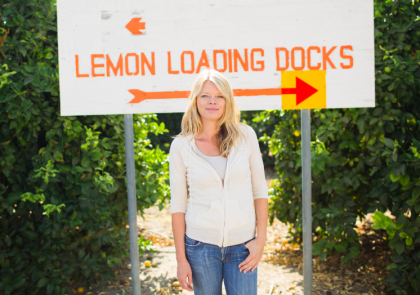Mary's story touches on an issue of the food system that is near and dear to all of us - the lack of connection between children and what they eat. Whether we have our own children or not, we were ALL a child once. It is easy, as the daughter of a farmer, to take for granted knowing exactly where your food comes from, and it was the shock of seeing a different perspective that spurred Mary to make a change in children's education - specifically, food education.
When did you know that you wanted to work in food?
I grew up on a small Holstein Dairy Farm in the Adirondack Mountains of upstate New York. I was spoiled with fresh milk, cream, butter, and cheese, every day. My mother was a stay-at-home mom who cooked slow food every night, with ingredients out of our prolific veggie garden. She specialized in old-fashioned American Cuisine - roasted chicken, meat loaf, and roast beef with roasted vegetables. She made the best apple pie with home made crust I have ever tasted. Christmas morning we had home baked bread?I could go on and on. For the winter months she canned everything under the sun, which we stored with the squash and potatoes in our cellar. Every summer my sisters had a farm stand in front of our house and my oldest brother, Robert, went on to be voted one of the 100 best young chefs in America by James Beard. My 'aha' food moment was happening all around me as a child on the farm. I like the logical order of things so it makes sense that, like my father, the consummate farmer, I am at the beginning of the Food Journey.
How did you get your current good food job?
In 2008 I realized that many children don't know where their food comes from. As the daughter of a dairy farmer I couldn't believe this. Even with America's rich Agricultural heritage, school children don't make the connection between the acres of farmland around them to the food on their table. That was the inspiration for founding Students for Eco Ed and Agriculture. My program makes that connection. Bringing kids to farms brings the message home even further. A pivotal moment in the success of the project is when I met with the CEO of the historic Limoneira Company and I explained the concept, and he thought it was a great idea. That's when I knew I had winner.
How did your previous work or life experience prepare you for a good food job?
The combination of growing up on a farm and having 20 years of business experience was the perfect foundation for my nonprofit. I would have to say the success of it is due to the perfect marriage of my past experiences. When I was 25 years old, I was living in Switzerland and was in charge of importing American Bicycle products into Switzerland, and I was also in charge of the sales of an American-made bicycle helmet in Europe. Living in Switzerland, traveling around Europe, eating diverse regional cuisine only added to my experience. Back then I never thought I would be running my own nonprofit in Ag Education.
What was the greatest obstacle you had to overcome in pursuing your Good Food Job dream?
Let's just say I think it's natural for some people to offer you great encouragement and support as you grow and become more successful in your endeavors. Others can become threatened. I have decided to surround myself with those people who are supportive and it has been working in my favor!
What can you identify as the greatest opportunities in food right now?
I think it's agricultural education. Every county in every state should have a few strong programs in K-12, to teach the next generation how and where their food comes from. This way they will start to appreciate the land, farms and the farmers that feed us and hopefully not take it for granted.
If you could be compensated for your work with something other than money, what would it be?
Farm animals. One day I would like to be compensated with the land I grew up on in upstate New York. My goal is to build a timber frame house on that land that looks like a gorgeous barn. My dream is to live there again one day with 2 Jersey cows, 2 Alpacas, a couple horses and a few sheep -Mary had a little lamb.









